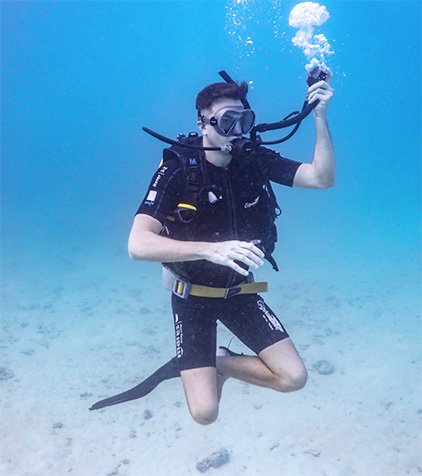SCUBA Diving Whilst Dehyrdrated,
Are You Guilty?
By: Nina Horne, PADI Master Instructor
As a scuba diver, you already know that preparation is key to a successful dive. You check your gear, plan your dive with your buddy, and make sure you’re familiar with the dive site. But there’s one crucial aspect of preparation that often goes overlooked: hydration. Staying adequately hydrated is vital not only to your safety but also to the overall enjoyment of your diving experience. Here’s why.

1. Enhanced Physical Performance
Diving is more physically demanding than it might appear. Managing your gear in and out of the water, swimming against currents, and adjusting your buoyancy are all tasks that require energy. Water is essential for your body’s energy production processes. When you’re hydrated, your physical performance is at its peak. Dehydration, however, can lead to fatigue and decreased stamina, which can impair your ability to manage the physical demands of diving.
2. Improved Thermal Regulation
Water plays a crucial role in regulating your body temperature. While diving, especially in colder waters, the body loses heat much faster than on the surface. An adequately hydrated body can maintain its core temperature more effectively. This not only helps in managing your comfort but also prevents hypothermia, a serious risk in cold-water diving.
3. Decreased Risk of Decompression Sickness
Decompression sickness (DCS) is a risk every diver learns to manage. While the mechanics of DCS involve nitrogen bubbles forming in your tissues and bloodstream during or after ascent, hydration plays a key role in its prevention. Proper hydration helps maintain good blood flow, allowing your body to more efficiently transport and eliminate inert gases you breathe from your scuba tank. Dehydrated tissues can trap these gases, increasing the risk of DCS.
4. Better Cognitive Function
Hydration affects cognitive function, including alertness, concentration, and decision-making capabilities. These mental faculties are crucial when diving as the underwater environment requires constant vigilance and quick, clear thinking to respond to the dynamic conditions or any emergencies that may arise.
5. Enhanced Comfort and Reduced Cramping
Muscle cramps are a common issue for divers, often exacerbated by factors like cold temperatures and vigorous finning. Hydration helps keep muscles functioning properly and reduces the likelihood of cramping. Keeping hydrated ensures that electrolytes, critical for muscle function, are at proper levels in your body. Do you often have issues equalising? Proper hydration can help so much with that too!

How to Stay Hydrated for Diving
Pre-Dive Hydration: Begin hydrating at least 24 hours before your dive. Drinking water steadily over this period is more effective than consuming a large volume just before the dive.
Monitor Your Fluid Intake: Drink small amounts frequently throughout your diving day. Water is best, but drinks with electrolytes can be beneficial if you are doing multiple dives or are diving in hot climates.
Avoid Dehydrators: Alcohol and caffeine can dehydrate your body. It’s best to avoid these beverages before diving.
Post-Dive Rehydration: After a dive, especially a long or deep one, replenish fluids by drinking water or electrolyte drinks to help your body recover and process gases.
By recognizing the role hydration plays in safe and enjoyable diving, you ensure that you’re not just ready to dive, but also to enjoy the underwater world comfortably and safely. Remember, when you’re well-hydrated, your diving experience will be significantly more pleasant and secure. Drink up and dive in!

